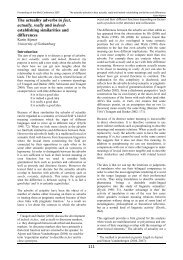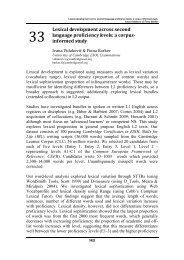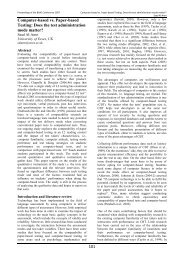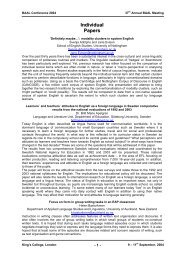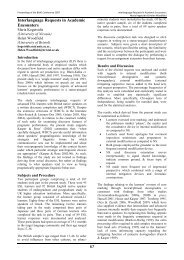Proceedings of the - British Association for Applied Linguistics
Proceedings of the - British Association for Applied Linguistics
Proceedings of the - British Association for Applied Linguistics
Create successful ePaper yourself
Turn your PDF publications into a flip-book with our unique Google optimized e-Paper software.
The Impact <strong>of</strong> <strong>Applied</strong> <strong>Linguistics</strong>: <strong>Proceedings</strong> <strong>of</strong> <strong>the</strong> 44th Annual Meeting <strong>of</strong> BAAL<br />
University <strong>of</strong> <strong>the</strong> West <strong>of</strong> England<br />
The importance <strong>of</strong> <strong>the</strong> word impact<br />
<strong>British</strong> applied linguistics has both a general and a specific interest in <strong>the</strong><br />
word impact. The general interest is because, like all good scholars, applied<br />
linguists should be wary <strong>of</strong> vague and undefined terms – academic<br />
discourse should strive <strong>for</strong> precision and clarity. The specific interest<br />
derives from <strong>the</strong> disciplinary concern with language use in society. Central<br />
to applied linguistics is <strong>the</strong> idea that choices <strong>of</strong> words matter, and that<br />
words <strong>of</strong> social significance and power should be submitted to critical<br />
scrutiny. One such word is impact, which has taken on a new prominence<br />
in academic life, and whose resonance merits some exploration.<br />
Word meanings change, sometimes through specific interventions (gay in<br />
<strong>the</strong> 1960s) or technological changes (mouse in <strong>the</strong> last two decades or so).<br />
For <strong>British</strong> academics impact has taken on a new significance following a<br />
very specific intervention: <strong>the</strong> demand <strong>for</strong> evidence <strong>of</strong> impact in <strong>the</strong> REF<br />
(Research Excellence Framework), <strong>the</strong> UK government's latest attempt to<br />
quantify academic success, and to reward or punish universities in line with<br />
that assessment (e.g. REF 2011a, 2011b). Yet this vague but powerful word<br />
has been subjected to very little scrutiny within our discipline, though it has<br />
been much discussed elsewhere (e.g. Collini 2009). The purpose <strong>of</strong> this<br />
paper is first to explore <strong>the</strong> significance <strong>of</strong> <strong>the</strong> word, and <strong>the</strong>n to consider<br />
not only current impacts <strong>of</strong> applied linguistics, but also current impacts on<br />
applied linguistics. Much <strong>of</strong> my argument addresses <strong>the</strong> situation in <strong>the</strong><br />
UK; hopefully it has a wider relevance, perhaps as a portent <strong>of</strong> things to<br />
come elsewhere.<br />
Etymology, denotation and semantic prosody<br />
The OED (Ox<strong>for</strong>d English Dictionary) tells us that impact derives from<br />
impactum, <strong>the</strong> passive participle <strong>of</strong> <strong>the</strong> Latin verb impingere (meaning to<br />
strike or dash against), and gives both literal and metaphorical meanings.<br />
Among literal meanings <strong>of</strong> impact as a verb are to press closely into or in<br />
something, to fix firmly in or to press into a confined space. This sense,<br />
dating back to at least 1601, survives in <strong>the</strong> phrase impacted teeth. Ano<strong>the</strong>r<br />
meaning is to come <strong>for</strong>cibly into contact with a larger body or surface.<br />
Among literal senses <strong>of</strong> impact as a noun are collision, <strong>the</strong> striking <strong>of</strong> one<br />
body against ano<strong>the</strong>r, and <strong>the</strong> action <strong>of</strong> one object coming <strong>for</strong>cibly into<br />
contact with ano<strong>the</strong>r. From this latter sense we get <strong>the</strong> current widespread<br />
metaphorical senses, denoting an impingement <strong>of</strong> circumstances or ideas<br />
on a person or situation. The first recorded such metaphorical use is by<br />
36



